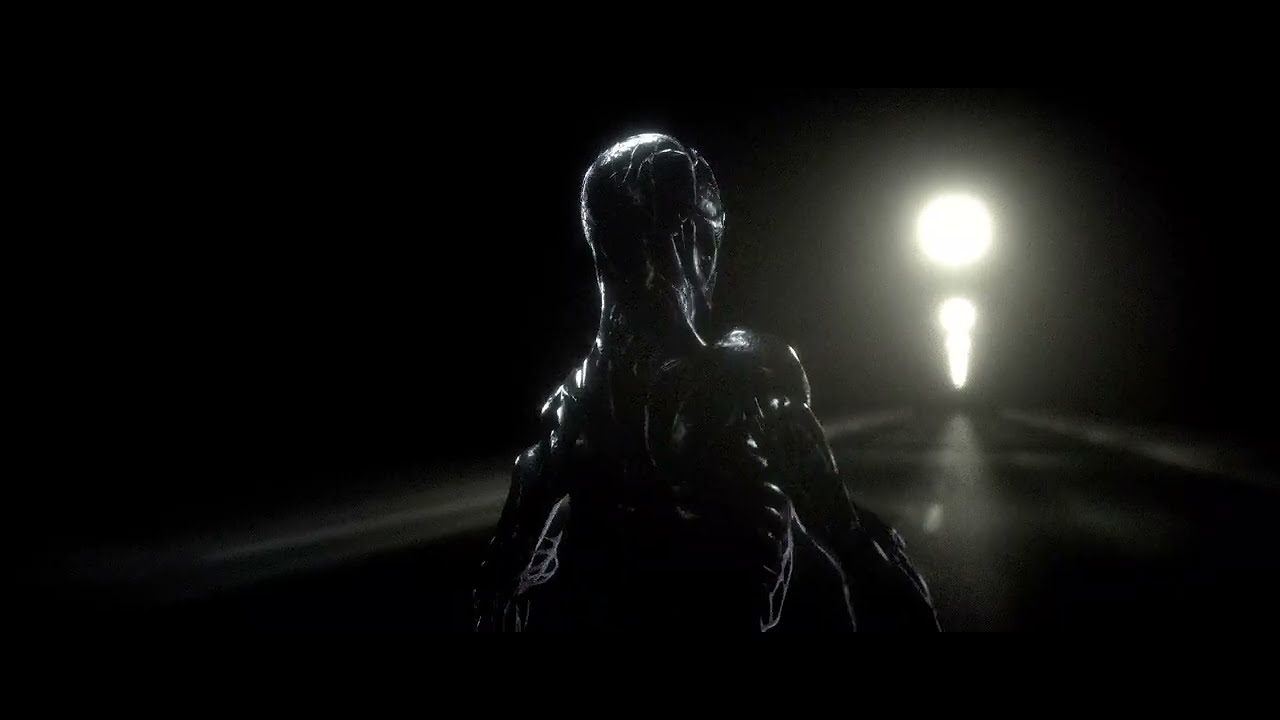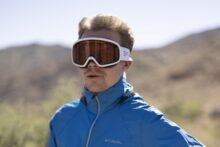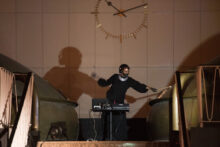Scalping portrait by Jamie Harding and Matthew Sterling of ‘we are jam’
In Bristol’s current weird music scene, there is a prevalent impulse to reconcile the city’s rich soundsystem culture with sensibilities indebted to heavy guitar music. From Giant Swan’s improvised industrial techno to the electrifying ranks of ‘crew label’ Avon Terror Corps (HARRGA, Bad Tracking, Fever 103, Kinlaw, Franco Franco), Bristol teems with artists melding the physicality of noise rock and punk with the impulsive space of the dancefloor.
This milieu’s latest manifestation is SCALPING: an audio-visual EBM group who – through the medium of a semi-traditional guitar band – create muscular techno drawing from punk, post rock and industrial. Comprising James Rushforth (bass), Isaac Jones (drums), Jamie Thomas (guitar) and Alex Hill (electronics), their heavily-improvised shows also feature striking live visuals, projected onto a huge screen behind them by collaborator Jason Baker.
Heralded amongst the UK’s most thrilling new guitar bands, SCALPING’s recent signing to Fabric-affiliates Houndstooth signals an equally-credible footing in the world of dance music. This duality underpins their explosive new EP Flood: their most long-form body of work to date, which Rushforth describes as an “exorcism” of their pre-pandemic live sets. “That’s why the EP’s at ‘100’ the whole time – it’s supposed to blow your head off.”
SCALPING ascribe their genre-straddling outlook to experiences in Bristol’s unique electronic scene. “It couldn’t really have happened anywhere else” Hill claims. From the advent of live reggae soundsystems in the 1960s and 1970s, through landmarks including The Wild Bunch in the 1980s, the 1990s trip
hop era and 2000s dubstep, Bristol’s musical landscape is enduringly shaped by a culture of embracing high-volume, bass-heavy music: experienced by SCALPING through contemporary entities like Young Echo and Timedance. “Through listening to metal and bands like Sunn O))), Swans and Mogwai, we always liked loud music” Hill explains. “Being exposed to electronic music in Bristol, we saw how that could cross into a world we were more familiar with. Then you’d see something like Giant Swan, where it’s dance music but performed by something that looks and feels like a band.”
“It’s a new kind of loud” Rushforth says of this distinction. “There’s the unpredictability and imperfection of distortion in guitars, but then the precision of a sine wave and a kick drum perfectly interacting with each other – we’re interested in exploring that imperfection and perfection together.” SCALPING duly consider their shows best experienced at extreme volume. “It has to be physical, it has to be loud” Rushforth says, citing their Simple Things Festival 2019 show in Bristol’s enormous SWX nightclub as their favourite gig to date. “40kg monitors were shaking across the stage – we were finally getting to convey that power in a room where you can feel it.” This fascination with physicality dominates Flood, from the thunderous opening of ‘Monolithium’ to the dizzying escalation of ‘The Perimeter’; from the throbbing, alien synths of ‘Cloudburst’ to the crushing, doom-adjacent break in ‘Empty Cascade’.
This immersion in Bristol’s electronic scene has accentuated, rather than diluted, the band’s shared passion for heavy guitar music. “I just like riffs man!” grins Thomas, whose searing guitar lines burst from Flood’s arrangements like the alien projections in its artwork. “It would be very easy to use the guitar in a way that shies away from being too extreme, in order to fit in to the electronic side of things” he says. “What’s ended up being more effective, is to be unafraid to do something that’s very obviously a guitar – and actually quite cheesy. Placed correctly, it’s fun and interesting because you’d never really hear it in that context”.
SCALPING perform with the accompaniment of an enormous screen, onto which Baker projects live animations playfully melding science-fiction, body-horror and shock-humour. “There isn’t a lead singer, so there has to be a personality that fills that space” Baker explains. While he describes his process as entirely impulsive and instinctive, these stunning visuals have developed over time as intriguingly as SCALPING’s music. While early visuals centred upon a gelatinous human figure, often shown falling through space or vomiting entrails, Baker’s more recent visuals (indicated by the video for ‘Monolithium’) exhibit a revised approach to the body. “I’m showing tubes going into people, veins and muscles… If I were to read into that, I’d say it’s because I’ve been quite engrossed in the pandemic” he says. “The frailty of the human body, and its connection with human-made chemistry and physics.”
In navigating the conventional live circuit, the extravagance of this project carries the risk of unwelcome incongruity in some settings. Recounting their experiences opening for Black Midi on their 2019 German tour, Baker describes the strangeness of setting up and packing down their projection screen each night before the headliner. “When people rock up at 8 o’clock they aren’t expecting that – even in Berlin” Rushforth adds with a laugh. “People were definitely shocked.”
“But it didn’t feel inappropriate” Hill clarifies. “Black Midi are so unusual, extreme and experimental, and their fans are very open to that. If it was a more straightforward band, maybe we would have felt a bit out-of-place being as bold as that.” Later this year SCALPING will open for Squarepusher, which Hill discusses with tremendous excitement. “He’s another one of those artists that has ‘crossed the boundary’ – playing dance music with a live band.”
Another major forebear of SCALPING’s cross-pollinating outlook is Andrew Weatherall, who passed away shortly before the first lockdown. While Rushforth recalls seeing the DJ at Wilderness Festival years earlier, he had not fully appreciated Weatherall’s relevance to his own genre-straddling aspirations until his death. Exploring The Weatherdrive, a 900-hour archive of Weatherall’s mixes dating back to when he was Rushforth’s own age, the musician developed a powerful connection with the DJ’s work which will inform future material. “In that first lockdown the weather was beautiful, but everything was hopeless and nobody knew what was going on” Rushforth says. “Learning about Andrew, his life and how much he left behind for so many people – while remaining constantly in the underground – was a very welcome distraction.”
“It was amazing as well seeing that audience is there, and those people willing to accept those genre-crossovers are there” Hill adds. “Seeing people give Andrew so much praise for things we’ve been excited about as well, and stuff we’ve tried to do, was really cool.”
We are briefly joined by the band’s producer Sean Oakley. Working alongside SCALPING since their 2019 standalone single ‘Ruptured’, he quickly involved himself after seeing them live for the first time. “It was relentlessly fantastic” he grins, describing the process of building Flood’s intense, high-fidelity productions as an enthralling challenge. “You have to approach it from a couple of different angles, because it is ‘band music’, but there is also this electronic element – you have to service both things.”
“Hopefully we can tread on both sides for as long as possible” Hill says. “It’s amazing turning up and playing at something like Arctangent – which is ‘rock bands’ in the biggest sense of the word – and then playing somewhere that’s more electronic based”. Their debut festival set at Arctangent 2018 is recalled with particular fondness by Hill. “We had no expectations, and suddenly there was a full tent. It was like ‘This really can work! People like this!’”
With the pandemic’s blanket disruption of live music prompting reflection on what we expect (and desire) from gigs and dancefloors alike, Flood encourages speculation on whether there might be more spaces for genre-straddling projects like SCALPING in this new, unsettled landscape. “This is a once-in-a-generation opportunity to have a ‘hard reset’.” Hill suggests. “To say ‘We don’t have to book the line-ups we usually would; we don’t need to have three guitar bands that all sound the same.’”
“Surely there’s going to be this resurgence in high-energy music” Rushforth additionally speculates. “Celebrating people being together, going wild and getting completely lost: realising everything can change, and everything’s so fucking fragile.”
Regardless of what the new live circuit might hold for them, this thrillingly unusual band are ecstatic about returning to the fray. “We’re just aware of how mad the shows were before,” Rushforth smiles, “and what’s going to happen now people have been wound back.”





